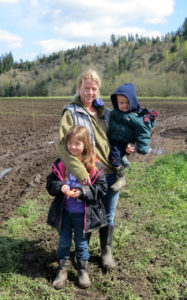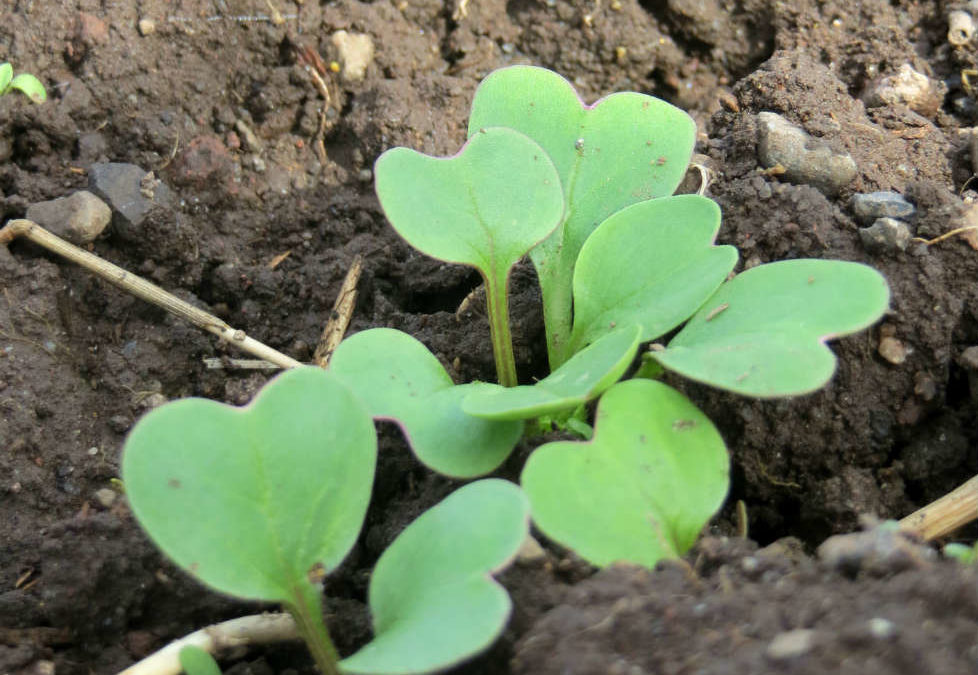Amy Moreno-Sills and her husband Agustin with more than 20 years of combined experience growing food are building their dream at Four Elements Farm, on land in Orting Valley. Amy knows it takes hard work to get a new business off the ground. She has successfully helped other farmers expand, change, and grow their businesses, and is excited and optimistic about what the future will bring. After completing a Sustainable Agriculture degree in 2001 from The Evergreen State College, she interned at Jubilee Farm (Snoqualmie Valley) for two years, worked for Full Circle Farm (Snoqualmie Valley) for five years, spent two years at Tahoma Farms (Orting Valley) and completed her journey at Terry’s Berries (Puyallup Valley). Now, Amy and Agustin are putting their own seed in the ground and growing a business.
Four Elements Farm
Four Elements Farm leased five acres on land conserved by PCC Farmland Trust in 2009, when 100-acres of prime farmland located three miles south of Orting, Washington were protected by removing the legal right to develop a residential subdivision and creating an opportunity for farmers to practice their trade. This farm ground was laid down in the 15th century when the Electron Mudflow inundated the Puyallup River Valley with upwards of 15 feet of Mount Rainier’s pyroclastic muck. The Puyallup and other Tribes lived in the Orting Valley and surrounding lands as hunter-gatherers, maintaining their lifestyle for centuries and experiencing the Mudflow, until settlers entered the valley in the mid-19th century. Early crops were hops and produce, and eventually tulips and daffodils, but ultimately, in the second half of the 20th century, the Orting Valley was peppered with small family-owned dairy farms. On what is now Four Elements Farm, Ted Ford ran a dairy operation for 45 years, naturally fertilizing and amending the soil.
Upcoming Season & Long-Term Plans

Amy’s Farming Family
Amy and Agustin expect to plant 65 different types of crops and sell them via three distribution methods: 1) Four Elements Farm’s Community Supported Agriculture (“CSA”) program, 2) on-site at Meadowood Organics in Enumclaw, and 3) through wholesale connections with Charlie’s Produce, Organically Grown Company, Terra Organics, Scholz Farm, Marlene’s Market, and others that could be interested in purchasing produce from a new farm.
Amy is eagerly and optimistically anticipating the upcoming season, as the forecast is for a good growing season and the farm has multiple advantages, as there is plenty of on-site pumped irrigation water, drain tiles to ensure water doesn’t stagnate below seedlings, and barns for storage of equipment. At the same time, California growers are experiencing a major drought and expect to scale back operations, since adequate water from snowmelt is unavailable for all of the State’s agricultural lands. As in 2012 when only 20% of Michigan’s tree fruit harvest produced and small farmers in Washington State benefited (Ensuring Food Security: Wade’s Vision), California farmers expect to plant at least 12% less land than in normal years. California’s agricultural losses could be Washington’s gain and Four Elements Farm’s opportunity.
Even with all these attributes and opportunities, ultimately the greatest resource is a farmer’s human ingenuity and business savvy. Despite being a new farm, Four Elements Farm does not have beginning farmers. Amy many years of experience makes her job easier with familiarity of the many pitfalls and challenges of running a farm business. Amy was instrumental in Full Circle Farms growth from a 260 to 5,000 CSA members being responsible for planning, planting, managing labor, ensuring availability of packaging supplies, and assisting the business owner in a constantly, rapidly changing, and increasing customer base.
On three other farms, working with the WSDA organic certifier, she completed the critical paperwork to create the premium value from organic production. Knowing that having a willing buyer before you put a seed in the ground is critical to building a viable business. She is innately familiar with the optimal time to pick produce, when and how to wash product, ensuring there are always adequate twist ties on-site ahead of harvest, and all the details of a creating a productive and profitable organic farm. Most importantly, the differences between being a “large-scale gardener” and a farmer are intuitively known. A produce farmer grows row crops, multi-tasks, makes rapid fire decisions, and changes plans at the first sign of rain or blistering heat, while a gardener is relaxed, knowing it is not a livelihood.
Agustin, partner in the Four Elements Farm team, cultivates and nurtures good tasting food during the extended summer daylight hours while working his day job across the street as farm manager at Tahoma Farms.
With support from the customers, colleagues, and friends, Amy and Agustin are working towards creating the ultimate dream; their own organic farm. With their enthusiasm and dedication, Four Elements Farm has the ingredients to become another small farm success story.
Kathryn Gardow, P.E., is a local food advocate, land use expert and owner of Gardow Consulting, an organization dedicated to providing multidisciplinary solutions to building sustainable communities. Kathryn has expertise in project management, planning, infrastructure, and civil engineering, with an emphasis on working to create communities that include food production. Kathryn’s blog muses on ways to create a more sustainable world. Gardow Consulting can also be found on Facebook.

